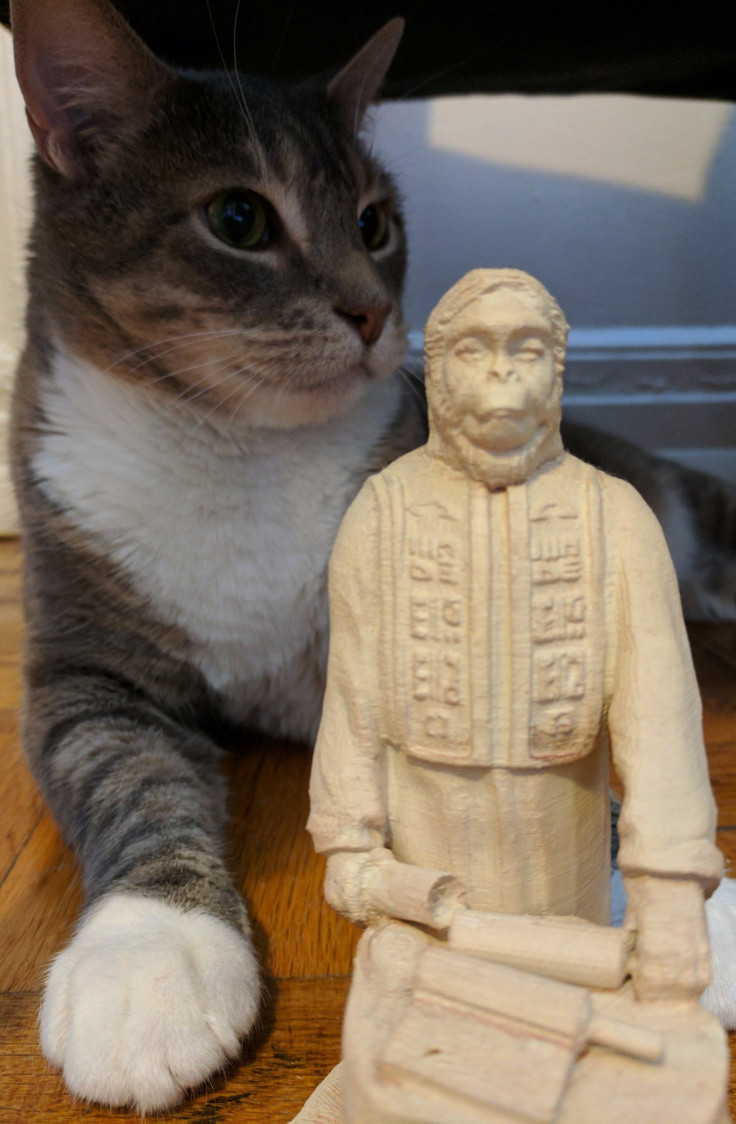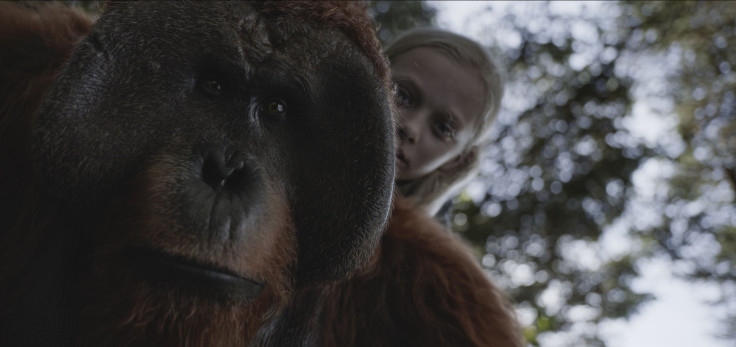By the end of War for the Planet of the Apes, the future feels far less uncertain than at the end of the previous two movies, which both found the apes in precarious situations. But with the war over — not so much won by apes, but lost by man — the ape future has been secured in a sprawling lakeside valley, a new land with new promises, far from the forest fortresses where the apes lived in hiding. They will build a future here, but they’ll have to build it without Caesar. Like Moses, he dies within sight of the holy land to which he’s brought his people. A revolutionary leader and uniter, yes, but Caesar is not to be the architect of ape society going forward. That job belongs to a character whose works will resonate far into the future, whose words are central to every previous Planet of the Apes movie, including the very first in 1968. After Caesar, the most important figure in ape history has always been the Lawgiver. And now War for the Planet of the Apes director Matt Reeves has confirmed: Maurice is destined to become the Lawgiver. But first, he might have to sell his soul.
Speaking to io9, Reeves described what he imagines for the future of the series. He speaks conjecturally, since the next Planet of the Apes movie doesn’t yet exist and Reeves, in the meantime, will be making The Batman. As always in film development, his ideas for ape society could change, or never make it to screen. Yet, he charts a future that not only proceeds logically from the events of the rebooted Planet of the Apes trilogy, but also fit with the eventual future of Earth, as seen in the original 1960s and 70s series of movies.
Caesar, who is scourged and crucified in War, will become a religious figure. “As the population changes, I imagine the legend will change,” Reeves said. “And there will be interpretations of the legend. And there will be the orthodox people who’ll be certain about what the legend is and then there’ll be sort of the more progressive and then that’s sort of the whole idea.”
Maurice will be the chronicler of Caesar’s life and the new series’ version of the Lawgiver. “In our minds, I think Maurice was also sort of going to become like the Lawgiver.”
So who is the Lawgiver?

By the time of the original Planet of the Apes, the Lawgiver is long dead. Aside from the statues and shrines of the Lawgiver all over Ape City, all that remains are his scrolls, which form the basis of ape society’s law and religion simultaneously. The apes hold the Lawgiver in religious reverence. Not only is it heresy to question his Sacred Scrolls, but his influence over the ape imagination is strong enough that he features prominently in a religious vision in Beneath the Planet of the Apes that induces terror in the gorilla army.
Though we don’t know the full text of the Sacred Scrolls, his words on humans are centrally featured in the 1968 Planet of the Apes. Here’s how they’re recited by Cornelius (father of the revolutionary leader Caesar in the second Planet of the Apes time loop… we’ll get to that in a bit):
“Beware the beast Man, for he is the Devil’s pawn. Alone among God’s primates, he kills for sport or lust or greed. Yea, he will murder his brother to possess his brother’s land. Let him not breed in great numbers, for he will make a desert of his home and yours. Shun him. Drive him back into his jungle lair, for he is the harbinger of death.”
That sure doesn’t sound like Maurice, who continues to have faith in the possible goodness of people throughout the rebooted Planet of the Apes series. As the moral center of the trilogy, overflowing with empathy for ape and human, it’s hard to imagine him calling for violence. He even adopts a human child, Nova. Will the gentle pacifist Maurice write words that become the basis for repression and violence against humans centuries later, when the apes rule the world?
We see a different side, a more Maurice side, to the Lawgiver in the fifth movie of the series, Battle for the Planet of the Apes, which portrays Caesar’s simultaneous final conflict with a remnant human army and a murderous ape insurgency. The Lawgiver, played by John Huston, appears in a frame story set years after the events of Battle, in 2670. He describes to children, human and ape alike, Caesar’s triumph over human wickedness and his hopes for a future of mutual harmony between the species:
“In the beginning, God created beast and man, so that both might live in friendship and share dominion over a world at peace. But in the fullness of time, evil men betrayed God’s trust and, in disobedience to his holy word, waged bloody wars… not only against their own kind, but against the apes, whom they reduced to slavery. Then God, in his wrath, sent the world a savior, miraculously born of two apes who had descended on Earth from Earth’s own future. And man was afraid, for both parent apes possessed the power of speech. So both were brutally murdered. But the child ape survived and grew up to set his fellow creatures free from the yoke of human slavery. Yet, in the aftermath of his victory, the surface of the world was ravaged by the vilest war in human history. The great cities of the world split asunder and were flattened. And out of one such city, our savior led a remnant of those who survived in search of greener pastures, where ape and human might live forever in friendship, according to divine will. His name was Caesar and this is his story in those far off days… We still wait, my children. But as I look at apes and humans living in friendship, in harmony and at peace, now some 600 years after Caesar’s death, at least we wait with hope for the future.”
This sounds a little more like Maurice in its optimism, but it certainly doesn’t sound like the timeline of events begun in Rise of the Planet of the Apes. It also doesn’t sound like the religious leader of the earlier films, whose words are used as an excuse to hunt and kill humans. There are a couple explanations, none of them particularly satisfying. The simplest is that Rise, Dawn and War are remakes, with no connection to the original films. New events, new Lawgiver.
But the Planet of the Apes series continuity has room for Maurice as the Lawgiver, if we’re determined to construct some big ol’ messy ball of canon. Though it’s all a bit tangled, nearly anything goes in Planet of the Apes, thanks to time travel and the multiple timelines it creates. In the second movie, Beneath the Planet of the Apes, the Earth is destroyed by the Alpha-Omega bomb (emblazoned with the same imagery as The Colonel’s army in War for the Planet of the Apes). In its sequel, Escape from the Planet of the Apes, Caesar and Zira travel back in time and give birth to Caesar, who leads the revolution portrayed in Conquest of the Planet of the Apes. Again, nothing like the simian flu and genetic engineering explanation for world events given in Rise and Dawn. With multiple time loops being central to Planet of the Apes continuity, it’s easy to imagine Maurice and Caesar as we now know them are the products of another time loop (Colonel Taylor’s time-travelling ship is even mentioned in Rise for the Planet of the Apes). In the Planet of the Apes series mankind and apes are doomed to conflict again and again. Different timeline, different Lawgiver.
In this context, Maurice doesn’t have to be the cruel Lawgiver of the original Planet of the Apes or the beneficent Lawgiver of Battle. Instead, he’s his own Lawgiver.
But that doesn’t mean the future ethics of Maurice’s ape society won’t curdle once against into political repression, state religious institutions, anti-science dogma and violence against humans. According to Reeves, “It will certainly be on Maurice’s shoulders to carry that legend forward to begin with. And then how that changes, and how that story gets passed from hand to hand… I mean, it’s like a game of Telephone. A message changes by the time it gets to the end of the line.”
If Maurice recreates the Sacred Scrolls like previous Lawgivers, then Telephone seems like an inapt metaphor — the whole point of writing things down is that exact words are the opposite of a game of Telephone. But Reeves’ central point, that future ape societies will interpret Maurice’s Lawgiver teachings however they want, is valid, just as the words of the U.S. Constitution are endlessly quibbled over and reinterpreted today. Which leaves us with three possibilities for how Maurice becomes the Lawgiver whose philosophies bring so much pain to the future: The Lawgiver Maurice either says and writes different words than alternate Lawgivers (1), is misinterpreted by future generations of apes (2), or becomes embittered against humans and intentionally codifies the future violence between the species (3). The Planet of the Apes comics offer a fourth explanation: subsequent religious leaders add to the Sacred Scrolls, including the Lawgiver’s children, distorting the Lawgiver’s work with their own biases and prejudices.
We’ll see if Maurice has a role to play in future Planet of the Apes series entries. But lacking that, I’ll stick with a simple hope: that Maurice writes and preaches a better future than man built, and a better future than previous iterations of his character dreamed.
- stunning special effects and worldbuilding
- Caesar and his apes are as magnetic as ever
- Apes have little to do, saddled with an uninspired plot
- The villain is a riff on better movies



















